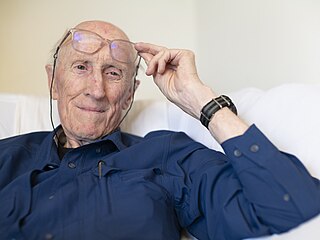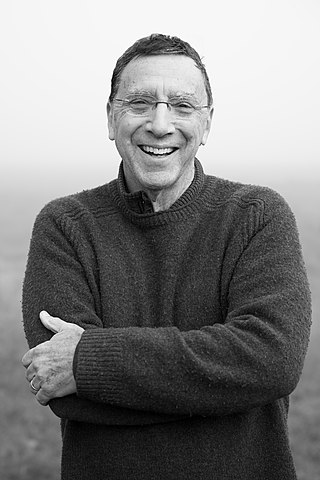
The Minitel, officially known as TELETEL, was an interactive videotex online service accessible through telephone lines. It was the world's first and most successful mass-market online service prior to the World Wide Web. It was developed in Cesson-Sévigné, Brittany by government-owned France Télécom.

The San Francisco Chronicle is a newspaper serving primarily the San Francisco Bay Area of Northern California. It was founded in 1865 as The Daily Dramatic Chronicle by teenage brothers Charles de Young and Michael H. de Young. The paper is owned by the Hearst Corporation, which bought it from the de Young family in 2000. It is the only major daily paper covering the city and county of San Francisco.

Stewart Brand is an American project developer and writer, best known as the co-founder and editor of the Whole Earth Catalog. He has founded a number of organizations, including the WELL, the Global Business Network, and the Long Now Foundation. He is the author of several books, most recently Whole Earth Discipline: An Ecopragmatist Manifesto.

The Emerald Triangle is a region in Northern California that derives its name from being the largest cannabis-producing region in the United States. The region includes three counties in an upside-down triangular configuration:

John Gregory Markoff is a journalist best known for his work covering technology at The New York Times for 28 years until his retirement in 2016, and a book and series of articles about the 1990s pursuit and capture of hacker Kevin Mitnick.

The Whole Earth 'Lectronic Link, normally shortened to The WELL or The Well, is a virtual community that was launched in 1985. It is one of the oldest continuously operating virtual communities. By 1993 it had 7,000 members, a staff of 12, and gross annual income of $2 million. A 1997 feature in Wired magazine called it "The world's most influential online community." In 2012, when it was last publicly offered for sale, it had 2,693 members. It is best known for its Internet forums, but also provides email, shell accounts, and web pages. Discussion topics are organized into conferences that cover broad areas of interest. User anonymity is prohibited.
Katie Hafner is an American journalist and author. She is a former staff member of The New York Times, and has written articles and books on subjects including technology and history. She co-produces and hosts the podcast series Lost Women of Science. Her first novel, The Boys, was published in 2022.
Tom Mandel was an American futurologist. He was born in Chicago, Illinois. He dropped out of college twice and served in the United States Marine Corps in the Vietnam War for nine months in 1969. In 1972, he was the first graduate of the "Futures program" at the University of Hawaii. He then did some graduate work in cybernetics at San Jose State University and was hired as a futurologist by SRI International in Menlo Park, California, in 1975.
Emporium Centre San Francisco is a shopping mall located in San Francisco, California, United States. Best known by its former name, San Francisco Centre, it is anchored by Bloomingdale's. It connects directly to the Powell Street station via an underground entrance on the concourse floor.

Track Down is a 2000 American crime thriller film based on the non-fiction book Takedown: The Pursuit and Capture of Kevin Mitnick, America's Most Wanted Computer Outlaw—By the Man Who Did It by Tsutomu Shimomura and John Markoff, about the manhunt for computer hacker Kevin Mitnick. It is directed by Joe Chappelle, with a screenplay by Howard A. Rodman, John Danza, and David & Leslie Newman. The film stars Skeet Ulrich as Mitnick and Russell Wong as Shimomura, with Angela Featherstone, Donal Logue, Christopher McDonald, Master P, and Tom Berenger.

OpenTable is an online restaurant-reservation service company founded by Sid Gorham, Eric Moe and Chuck Templeton on July 2, 1998 and is based in San Francisco, California.

Two tiger attacks occurred at the San Francisco Zoo, in 2006 and 2007, both involving a female Siberian tiger named Tatiana. In the first incident, a zookeeper was bitten on the arm during a public feeding. In the second incident, one person was killed and two others were injured before police shot and killed Tatiana on the scene.

Edwin Mah Lee was an American politician and attorney who served as the 43rd Mayor of San Francisco from 2011 until his death in 2017.

Masa's Wine Bar & Kitchen was a new French restaurant located in San Francisco, California, in the United States.

Robert Paul Commanday was an American music critic who specialized in classical music. Among the leading critics of the West Coast, Commanday was a major presence in the Bay Area music scene over a five-decade career. From 1964 to 1994 he was the chief classical music critic of the San Francisco Chronicle, following which he became the founding editor of San Francisco Classical Voice in 1998.

Mendocino State Hospital, formally known as Mendocino State Asylum for the Insane, was a psychiatric hospital located in Talmage near Ukiah, California. It was established in 1889 and in operation from July 1893 to 1972. The hospital programs included the rehabilitation of the criminally insane, alcoholic and drug abuse rehabilitation, a psychiatric residency program, industrial therapy, and others. The property now is part of the City of Ten Thousand Buddhas community.

SFGate is a news website based in San Francisco, California, covering news, culture, travel, food, politics and sports in the San Francisco Bay Area, Hawaii and California. The site, owned by Hearst Newspapers, reaches approximately 25 million to 30 million unique readers a month, making it the second most popular news site in California after the Los Angeles Times.
The Luggage Store Gallery, also known as 509 Cultural Center, is a non-profit, multi-disciplinary arts organization founded in 1987, and has two venues located in the Tenderloin neighborhood of San Francisco, California. The organization has sponsored many local artists, including those that are considered to be part of the Mission School, and of skateboard or street art culture.

The Hotel Utah is a historic mixed-use building known as a saloon bar, live music venue, and residential hotel, built in 1908 and located in the South of Market neighborhood of San Francisco, California. It is known for its diverse open mic nights, which have historically attracted some people who have later become famous. It is also known as The Utah Inn, The Hotel Utah Saloon, and simply The Utah.
Cliff Figallo was an American planner, designer and manager of social media platforms. He was a member of The Farm, an intentional community founded in 1971, and helped create The WELL, one of the earliest online communities in America, the Table Talk online discussion forum for Salon.com and the Electronic Frontier Foundation.















